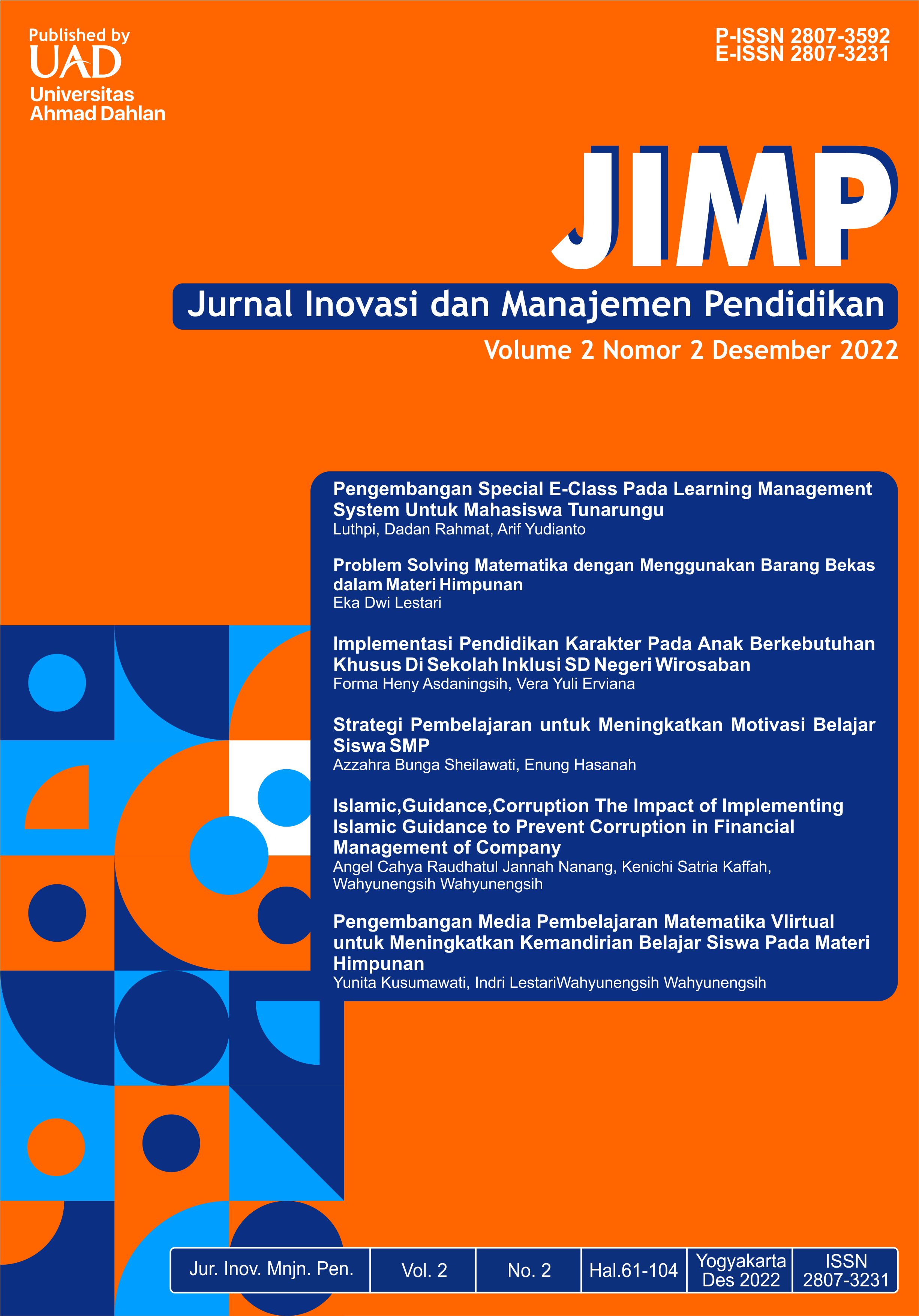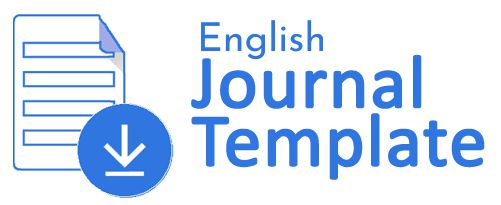Islamic,Guidance,Corruption The Impact of Implementing Islamic Guidance to Prevent Corruption in Financial Management of Company
English
DOI:
https://doi.org/10.12928/jimp.v2i2.6091Keywords:
Corupption, Financial, Company, Guidence, IslamicAbstract
Financial management is an important unit in the organization system. Financial management is the central for implementing organization activity. In the other hand, financial management in Indonesia often the corruption and manipulating financial data.
Transparency International Indonesia (February 2022) rate Indonesia at 96 from 180 country’s in the corruption perception index. So, the budget allocation in a program is not efficient and can have impact on the success of the program. Actually the government of Indonesia have been launching many policy to prevent the corruption. But until now, all policy is fail.This study aimed to analyze what’s the motifs behind corruption in financial management. and to analyze how to prevent corruption in financial management with Islamic guidance.
This research was used qualitative analyze. the qualitative method aim to describe and analyze character of informant relating to the impact of implementing Islamic guidance to prevent corruption in financial management. According Moleong (2012), research method qualitative is a research method which the results descriptive data in the form of words verbal messages from people whose behavior can observed by researcher. The collecting data method used interview method. Interview is a method of collecting data by asking questions something to someone who is an informant or respondent (Afifuddin, 2009).The interview have 36 questions to know experiences all informant and education received from they parents. We would like to analyze child experience in home, parents education in the golden age, study experience in the school, and work experience. The research result are implementing Islamic guidance since the child, can be prevent corruption when they work in a company. The Islamic guidance importantly pray in 5 times can be develop person to be the honest, obedience, and always on time. All of this nature will be prevent corruption by low moral. In addition, a good work environment and good roles can be impact to prevent corruption opportunity. Just like invironmen will be able to develop behavior the child.
References
Ludigdo,Unti. (2018).KORUPSI DI PERGURUAN TINGGI, 4 (1),hlm,1-12.
Sofian,Amri. (2017). PERAN PENDIDIKAN AGAMA ISLAM DALAM MENUMBUHKAN KARAKTER ANTI KORUPSI, 1(1),hlm,12-17. doi : 10.18326/mdr.v8i2.173-200
Hakim,Lukman. Model Integrasi Pendidikan Anti Korupsi,hlm 14-16.
Rabain,Jamaluddin. (2014). PERSPEKTIF ISLAM TENTANG KORUPSI, 39 (2),hlm,10-12. doi : 10.24014/an-nida.v39i2.875
Pusvitasari,Rita & Mukhamad Sukur. (2020). MANAJEMEN KEUANGAN SEKOLAH DALAM PEMENUHAN SARANA PRASARANA PENDIDIKAN : Studi kasus di SD Muhammadiyah 1 Krian, Sidoarjo, 4 (1),hlm, 3-13.
Sumarno, S., Gimin, G., & Nas, S. (2017). Dampak Biaya Kuliah Tunggal Terhadap Kualitas Layanan Pendidikan. Kelola: Jurnal Manajemen Pendidikan, 4 (2), hlm,184-194. doi : 10.24246/j.jk.2017.v4.i2.p184-194
Abdi,Fairus. (2020). PERAN KONSELOR DALAM PENANAMAN PENDIDIKAN ANTIKORUPSI BAGI SISWA SMPN 5 KEPANJEN. 1 (1),hlm,10-12. doi : 10.32806/jkpi.v1i1.7
Sukandar,Warlan. (2018). Korupsi dalam Perspektif Konseling Islam: Hakikat dan Penanganannya, 5 (1), hlm 3-19.
Wahid,Lalu Abdurrachman & Etty Setiawati. (2021). UPAYA MENINGKATKAN KECERDASAN SPIRITUAL UNTUK MENGATASI KASUS KORUPSI PERSEPEKTIF BIMBINGAN DAN KONSELING ISLAM. 19 (1), hlm 41-59. doi : 10.20414/tasamuh.v19i1.3269
Hatmodjosoewito, Soenarmo. (2010). HUBUNGAN ANTARA TRANSPARANSI PENGELOLAAN UNIVERSITAS DENGAN KINERJA KARYAWAN DALAM RANGKA MENCIPTAKAN GOOD UNIVERSITY GOVERNANCE, 10 (1), hlm 1-18.
Rosi,Fandi. (2016). Teori Wawancara Psikodignostik. Yogyakarta : Leutikaprio.
Saleh,Adnan Achiruddin. (2018). Pengantar Psikologi. Makassar : Aksara Timur.
Zuchdi, D. (2009). Pendidikan Karakter Grand Design dan Nilai-nilai Target. Yogyakarta: UNY Press.
Jalaluddin. (2006). Korupsi Hukum dan Moralitas Agama Mewacanakan Fikih Anti Korupsi. Yogyakarta: Gema Media.
Dedi Supriadi. (2006). Satuan Biaya Pendidikan Dasar dan Menengah. Bandung: Remaja Rosdakarya.
Elfindri. (2011). Pendidikan Sebagai Barang Ekonomi. Bandung: Lubuk Agung.
Downloads
Published
How to Cite
Issue
Section
License
Copyright (c) 2022 Universitas Ahmad Dahlan

This work is licensed under a Creative Commons Attribution-ShareAlike 4.0 International License.
This article's copyright is transferred to Universitas Ahmad Dahlan (UAD) if and when the item is accepted for publication. The undersigned hereby transfers any rights in and to the paper including without limitation all copyrights to UAD. The undersigned hereby represents and warrants that the article is original and that he/she is the author of the paper, except for material identified as to its source, with permission notices from the copyright owners where required. The undersigned represents that he/she has the power and authority to make and execute this assignment.
We declare that:
This paper has not been published in the same form elsewhere.
It will not be submitted anywhere else for publication before acceptance/rejection by this Journal.
Copyright permission is obtained for materials published elsewhere and which require this permission for reproduction.
Furthermore, I/We hereby transfer the unlimited rights of publication of the above-mentioned paper in whole to UAD. The copyright transfer covers the exclusive right to reproduce and distribute the article, including reprints, translations, photographic reproductions, microform, electronic form (offline, online), or any other reproductions of similar nature.
The corresponding author signs for and accepts responsibility for releasing this material on behalf of any co-authors. This agreement is to be signed by at least one of the authors who have obtained the co-author(s) assent where applicable. After submission of this agreement signed by the corresponding author, changes of authorship or in the order of the authors listed will not be accepted.
Retained Rights/Terms and Conditions
Authors retain all proprietary rights in any process, procedure, or article of manufacture described in the Work.
Authors may reproduce or authorize others to reproduce the Work or derivative works for the author's personal use or company use, provided that the source and the UAD copyright notice are indicated, the copies are not used in any way that implies UAD endorsement of a product or service of any employer, and the documents themselves are not offered for sale.
Although authors are permitted to re-use all or portions of the Work in other works, this does not include granting third-party requests for reprinting, republishing, or different types of re-use.







